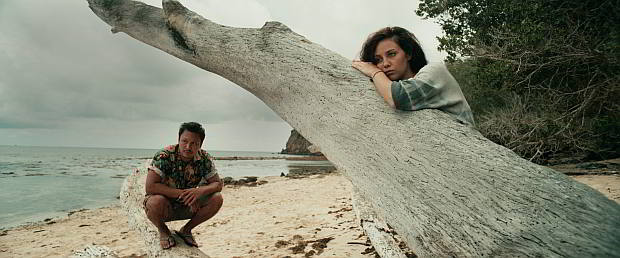Substantially eighty-five minutes of drifting, crashing, riding on waves of intimacy both high and low, “Waves” follows two estranged inter-racial lovers on the brink of seeking a second chance at being back into each other’s arms. Baron Geisler plays Ross, a broken architect and interloper to Ilona Struzik’s distraught Sofia seemingly seeking some kind of a closure. The opening scene is a shot inside an airplane—with a pensive Sofia, she of disheveled hair and the saddest of eyes—in a slight soliloquy of introspection that sets the tone of longing.
What happens if the greatest love of your life that you have been missing greatly decides to drop a magazine (via the mail) with her face splashed in the inside pages, like an ambivalent invitation?
Certainly you’d drop everything just to see her one last time, right? That’s exactly what happened when Ross asked for just one hour (Ilona plays a globe-trotting supermodel incidentally in the country for a quick passing through) that got extended on a deliberate detour to paradise.
The premise is that Sofia is happily kidnapped by her former lover on the pretext that they wouldn’t talk about “Richard” (absent in the entire film that stretches the tension all the more)—only to find out that her heart was to be the ransom and hostage, both. But she is not the victim here, no one is except the crushing circumstances. The film then becomes too intimate that the audience are transformed to be voyeurs of the lovers’ into the unknown. The lovers’ quarrels are sometimes painful to watch because it’s only the two of them can comprehend, the way that it should be.
One particular scene shot in the placid waters of Palawan shows the two lovers enjoying their solitude but an emotional wreck Ross, already intoxicated, betrays a breaking down upon the discovery of an engagement ring he found from rummaging in the bag of Sofia the night before. After the confrontation scene literally with their faces above water, what transpired next is a scene of the two lovers in the raft, with Sofia throwing away her ring into the water.
After maybe a day or so, in a subdued eureka moment, Ross found the ring awashed ashore by the turbulent waves of the night before, took a look at it glimmering in the sun. Fast forward to the penultimate ending, Ross gave back the ring to Sofia not with a resignation but of restraint, holding back tears.
Perhaps this is the biggest loophole for going for a cloud 9: it doesn’t compel the audience to caring for the characters because it is never their business to do so, anyway. As it is typically in the case with real conversations, the dialogue (in English) is punctuated by both periodic lulls and flashes of genuine insight, by quietly if not almost to a whisper of perceptive observations and remembering.
Pilar Pilapil gives a luminous performance as the very accommodating to a fault resort-owner who was innocuously nosy that pesters the star-crossed lovers with questions they both need to confront someday soon. Her bright and brief shining was her own breakdown scene as seen by Ilo Sofia clandestinely. It was tour de force acting.
The choice of Palawan as the setting understates that all is not well in paradise: the beautiful scenery is the backdrop of a major heartbreak. The script is a bit awkward at first (even mumbly sometimes which is justified), but nothing prepares the pleasantly surprise leisurely-paced tear-jerker: there’s little on the agenda besides romance and delayed heart breaks. Skeptical viewers might have trouble connecting with the characters—especially those who’ve never abandoned their intellectual armaments in watching this debut film, but director/producer Don Gerardo Frasco deserves credit for crafting such an impressive sense of naturalism. His background in cinematography comes in handy for composing a glossy and by global standards visually arresting celluloid genius. There was never a single steady or almost stillness-like shot; it was always moving but never annoying. Likewise Baron and Ilona, neither of whom even seem to be method acting (they are that convincing), as heavily tattooed Pinoy and her fashionista Polish nymph/child-woman converse loudly and subtly, all at once, about love and it’s unspeakable twin, loss. For all the ambivalence only lovers know, though, the film’s most intimate moments come when nothing is said at all, such as the tender scenes in the confines of the hammock outside the resort, unmindful of the coming squall, and the silences in between living.



